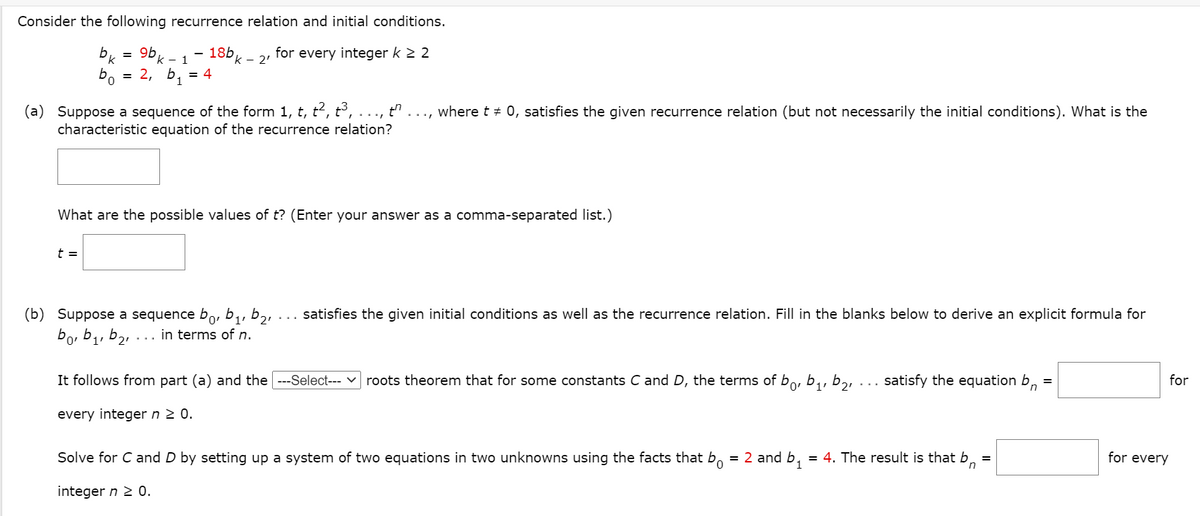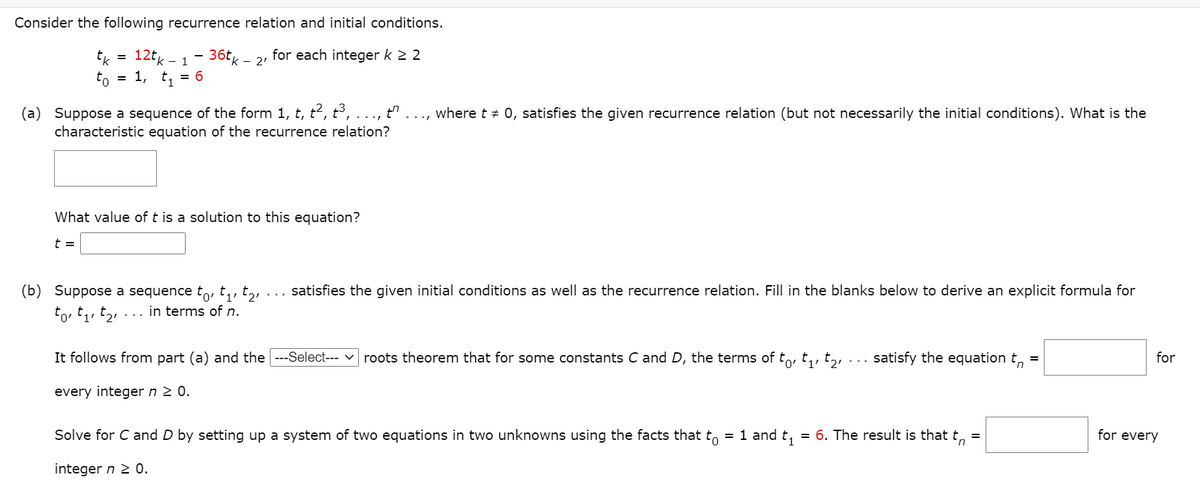Consider the following recurrence relation and initial conditions. bk = 9bk - 1- 18b, - 2, for every integer k 2 2 bo = 2, b, = 4 (a) Suppose a sequence of the form 1, t, t2, t³, .., tª ., where t + 0, satisfies the given recurrence relation (but not necessarily the initial conditions). What is the characteristic equation of the recurrence relation? What are the possible values of t? (Enter your answer as a comma-separated list.) t = (b) Suppose a sequence bo, b,, b,, ... satisfies the given initial conditions as well as the recurrence relation. Fill in the blanks below to derive an explicit formula for bo, b,, b2, ... in terms of n. It follows from part (a) and the --Select--- v roots theorem that for some constants C and D, the terms of bo, b,, b,, ... satisfy the equation b, = fo every integer n 2 0. Solve for C and D by setting up a system of two equations in two unknowns using the facts that b, = 2 and b, = 4. The result is that b, = for every integer n 2 0.
Consider the following recurrence relation and initial conditions. bk = 9bk - 1- 18b, - 2, for every integer k 2 2 bo = 2, b, = 4 (a) Suppose a sequence of the form 1, t, t2, t³, .., tª ., where t + 0, satisfies the given recurrence relation (but not necessarily the initial conditions). What is the characteristic equation of the recurrence relation? What are the possible values of t? (Enter your answer as a comma-separated list.) t = (b) Suppose a sequence bo, b,, b,, ... satisfies the given initial conditions as well as the recurrence relation. Fill in the blanks below to derive an explicit formula for bo, b,, b2, ... in terms of n. It follows from part (a) and the --Select--- v roots theorem that for some constants C and D, the terms of bo, b,, b,, ... satisfy the equation b, = fo every integer n 2 0. Solve for C and D by setting up a system of two equations in two unknowns using the facts that b, = 2 and b, = 4. The result is that b, = for every integer n 2 0.
Linear Algebra: A Modern Introduction
4th Edition
ISBN:9781285463247
Author:David Poole
Publisher:David Poole
Chapter4: Eigenvalues And Eigenvectors
Section4.6: Applications And The Perron-frobenius Theorem
Problem 56EQ
Related questions
Topic Video
Question
Discrete Mathematics:
Please provide an explanation with answers:
Please check the image for questions and provide answers to the blanks in it. (for the select option in part (b.) it is either distinct or single)

Transcribed Image Text:Consider the following recurrence relation and initial conditions.
9b
k - 1
18bk - 2'
for every integer k 2 2
b.
0,
= 2, b1
= 4
(a) Suppose a sequence of the form 1, t, t2, t³,
characteristic equation of the recurrence relation?
..., where t # 0, satisfies the given recurrence relation (but not necessarily the initial conditions). What is the
What are the possible values of t? (Enter your answer as a comma-separated list.)
t =
(b) Suppose a sequence bo, b1,
bo, b1, b2,
satisfies the given initial conditions as well as the recurrence relation. Fill in the blanks below to derive an explicit formula for
in terms of n.
It follows from part (a) and the ---Select--- v roots theorem that for some constants C and D, the terms of bo, b,, b,,
satisfy the equation b,
for
1'
every integer n 2 0.
Solve for C and D by setting up a system of two equations in two unknowns using the facts that b.
= 2 and b,
= 4. The result is that bn
for every
integer n 2 0.

Transcribed Image Text:Consider the following recurrence relation and initial conditions.
tk
12tk - 1
36tg
for each integer k 2 2
%D
2'
to
= 1, t, = 6
(a) Suppose a sequence of the form 1, t, t², t³,
characteristic equation of the recurrence relation?
where t + 0, satisfies the given recurrence relation (but not necessarily the initial conditions). What is the
What value of t is a solution to this equation?
t =
(b) Suppose a sequence to, t, t2
satisfies the given initial conditions as well as the recurrence relation. Fill in the blanks below to derive an explicit formula for
in terms of n.
It follows from part (a) and the --Select--- v roots theorem that for some constants C and D, the terms of to, t,, t,,
satisfy the equation t, =
for
every integer n 2 0.
Solve for C and D by setting up a system of two equations in two unknowns using the facts that to = 1 and t,
= 6. The result is that t,
for every
integer n 2 0.
Expert Solution
This question has been solved!
Explore an expertly crafted, step-by-step solution for a thorough understanding of key concepts.
This is a popular solution!
Trending now
This is a popular solution!
Step by step
Solved in 5 steps

Knowledge Booster
Learn more about
Need a deep-dive on the concept behind this application? Look no further. Learn more about this topic, advanced-math and related others by exploring similar questions and additional content below.Recommended textbooks for you

Linear Algebra: A Modern Introduction
Algebra
ISBN:
9781285463247
Author:
David Poole
Publisher:
Cengage Learning

Linear Algebra: A Modern Introduction
Algebra
ISBN:
9781285463247
Author:
David Poole
Publisher:
Cengage Learning